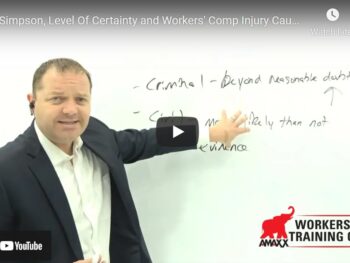A minority of jurisdictions make awards whenever the injury occurred because the employment required the worker to occupy what turned out to be a place of danger. Under this "positional" risk, or "but-for" test, the need to establish a causal relationship between in employment and the injury is relaxed or even eliminated. The majority rule, however, is that the employment must in some sense increase the worker's risk of injury.
Representative of other cases where courts have refused to follow the positional risk rule, but have nevertheless found an increased risk of injury is the case of Restaurant Dev. Group v. Oh, 2009 Ill. App. LEXIS 407 (June 16, 2009), in which a bartender working near the front of a restaurant's large glass window sustained gunshot wounds during a gang shootout. Evidence that the restaurant was located in a high crime area, that the bartender worked late at night, and that there had been a history of gunfire in the neighborhood was sufficient to establish that the bartender faced an increased risk of injury. See Larson's Workers' Compensation Law Ch. 7, § 7.01[3] n.38.2.
Unexplained deaths can be particularly problematic for the courts. Many states employ some sort of presumption, that unwitnessed deaths (or injuries) are presumed to have arisen from the employment. That presumption can be rebutted, however, as was the case in a recent New York decision, Matter of Ruper v. Transportation Sys. of W. N.Y., 58 A.D.3d 930, 870 N.Y.S.2d 623 (2009). Claimant's husband, a tractor-trailer driver, had arrived for work at approximately 11:30 A.M. and was assigned to drive an empty trailer to West Virginia. Hours passed and no one heard from him. A search ensued and decedent's body was found slumped against a flatbed trailer in the employer's parking lot at approximately 4:45 P.M. A Workers' Compensation Law Judge awarded benefits, finding that the death was unwitnessed and the employer did not sufficiently rebut the presumption contained in N.Y. Workers' Comp. Law § 21.
On review, the Workers' Compensation Board reversed, based on its determination that the employer had rebutted the presumption. Claimant appealed. The appellate court noted that the employer presented decedent's death certificate and the results of an autopsy, both of which attributed his death solely to arteriosclerotic coronary artery disease. The employer also submitted the report and testimony of a cardiologist who concluded that decedent's death was not work related but due to a preexisting heart condition. Inasmuch as the record evidence supported the Board's determination that decedent's death was not work related, the appellate court could not disturb it. See Larson's Workers' Compensation Law Ch. 7, § 7.04[2] (Digest) n.38.
Check out the LexisNexis Workers Compensation Community to connect with other members: http://www.lexisnexis.com/community/workerscompensationlaw/
© Copyright 2010 LexisNexis. All rights reserved. This material is excerpted from Larson’s Workers’ Compensation Law. Reprinted with permission.
WC Round Table LinkedIn: http://www.linkedin.com/groups?homeNewMember=&gid=1922050/
FREE IQ Test: http://www.workerscompkit.com/intro/
WC Books: http://www.LowerWC.com/workers-comp-books-manuals.php
WC Calculator: http://www.LowerWC.com/calculator.php
TD Calculator: http://www.LowerWC.com/transitional-duty-cost-calculator.php
Do not use this information without independent verification. All state laws vary. You should consult with your insurance broker or agent about workers' comp issues.
WC Books: http://www.LowerWC.com/workers-comp-books-manuals.php
WC Calculator: http://www.LowerWC.com/calculator.php
TD Calculator: http://www.LowerWC.com/transitional-duty-cost-calculator.php
Do not use this information without independent verification. All state laws vary. You should consult with your insurance broker or agent about workers' comp issues.
©2010 Amaxx Risk Solutions, Inc. All rights reserved under International Copyright Law. If you would like permission to reprint this material, contact Info@WorkersCompKit.com






















